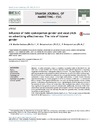Identificador persistente para citar o vincular este elemento:
https://accedacris.ulpgc.es/jspui/handle/10553/43294
| Título: | Influence of radio spokesperson gender and vocal pitch on advertising effectiveness: The role of listener gender. Influencia del género y el tono de voz del portavoz radiofónico en la eficacia publicitaria: papel del género del oyente | Autores/as: | Martín Santana, Josefa Delia Reinares-Lara, E. Reinares-Lara, P. |
Clasificación UNESCO: | 57 Lingüística 570510 Sociolingüística |
Palabras clave: | Radio; Advertising effectiveness Advertising effectiveness Spokesperson vocal-pitch Spokesperson gender Listener gender, et al. |
Fecha de publicación: | 2017 | Editor/a: | 2444-9695 | Publicación seriada: | Spanish Journal of Marketing - ESIC | Resumen: | In radio advertising, there is a tendency to employ males in the belief that the male voice is more credible and effective. Because of this, advertising practice is encouraging gender discrimination in disregard of objective criteria. This paper analyzes the effects of spokesperson gender and vocal pitch and their interaction, as well as the effect of listener gender
on effectiveness in relation to a radio spot for a non-gendered product (blood donation). We conducted a 2 (male---female voices) ×2 (low-high vocal pitches) ×2 (male---female listeners) experimental design via 4 radio programs in which we inserted a radio spot in a commercial block. A sample of 987 Spanish radio listeners was used. Our findings contrast with the existing practice in advertising of preferring male voices, highlighting the need for objective criteria in the selection of voices. In fact, the results shows that vocal pitch has a direct effect which is more significant than gender in terms of unaided recall. Additionally, the results of the interaction effect between spokesperson gender and vocal pitch reinforce the use of female voices, as low-pitched female voices are precisely the ones that generate more favorable attitudes toward the ad and the brand. En la publicidad radiofónica, existe una tendencia a emplear varones, en la creenciade que la voz masculina es más creíble y eficaz. Debido a ello, la práctica publicitaria animaa la discriminación de género, haciendo caso omiso de los criterios objetivos. Este documentoanaliza los efectos del género y el tono de voz del portavoz y su interacción, así como el efectodel género del oyente en la efectividad, con relación a un anuncio radiofónico de un productocarente de género (la donación de sangre). Utilizamos un dise˜no experimental de 2 (vocesvarón-mujer) x 2 (tonos de voz bajos-altos) x 2 (oyentes varón-mujer) a través de 4 programasde radio en los que insertamos un anuncio radiofónico en un bloque comercial. Se utilizó unamuestra de 987 oyentes radiofónicos espa˜noles. Nuestros hallazgos contrastan con la prácticaexistente en publicidad, de preferir las voces masculinas, subrayando la necesidad de criteriosobjetivos en la selección de voces. De hecho, el resultado refleja que el tono de voz tiene unefecto directo, que es más significativo que el género en términos de recordación espontánea.Además, los resultados del efecto de interacción entre el género del portavoz y el tono de vozrefuerzan la utilización de voces femeninas de tono bajo, ya que éstas son precisamente lasque generan actitudes más favorables hacia el anuncio y la marca. |
URI: | https://accedacris.ulpgc.es/handle/10553/43294 | ISSN: | 2444-9695 | DOI: | 10.1016/j.sjme.2017.02.001 | Fuente: | Spanish Journal of Marketing - ESIC[ISSN 2444-9695],v. 21, p. 63-71 |
| Colección: | Artículos |
Citas SCOPUSTM
14
actualizado el 08-jun-2025
Visitas
234
actualizado el 15-ene-2026
Descargas
181
actualizado el 15-ene-2026
Google ScholarTM
Verifica
Altmetric
Comparte
Exporta metadatos
Los elementos en ULPGC accedaCRIS están protegidos por derechos de autor con todos los derechos reservados, a menos que se indique lo contrario.
